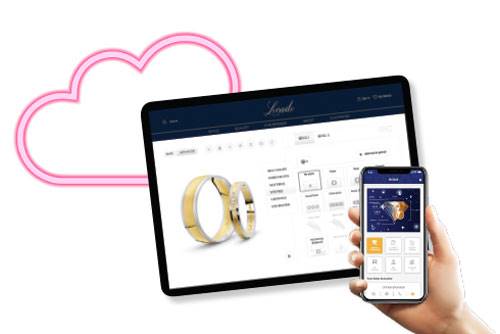 |
| L to R: Palloys’ Livadi; Diamonds on Call |
Enter ‘cloud-based’ technology, SaaS (software as a service) and the subscription economy; that jeweller’s toolbox has become more like a tool shed!
More importantly, and whether you like it or not, as a small business you will increasingly become reliant on all three - if you aren’t already.
Even though you may not recognise the term, there’s little doubt that your business is likely involved in SaaS to some degree now.
Based in Queensland, Retail Edge Consultants is a management consultancy business which specialises in jewellery retail operations. The company’s point-of-sales technology is installed in more than 3,500 stores worldwide – split between Australia, New Zealand and the US.
The jewellery retail trade has evolved significantly in the past three decades and Retail Edge’s president David Brown has witnessed it all.
“I think that we find ourselves at another pivotal moment in the history of the industry, particularly in terms of the relationship between digital presence and physical presence,” Brown explains.
“It wasn’t always the way it is today – jewellery retail used to be a static industry that was very slow and very resistant to change. Recently, I’ve had to remind a lot of our clients that many of them had to be dragged kicking and screaming into the computerisation of their business in the first place.”
SaaS is a trend in retail that has flourished as business owners increasingly realise that their competitor is no necessarily longer ‘down the street’ or in the next suburb - it could be someone in a different state or even overseas.
The answer to the challenge posed by the double-edged sword of the digital economy? Well, one solution is the way that businesses can maximise their reach, efficiency and promote their brand to a much larger audience by new technology, often in the form of SaaS.
Therefore, the double-edged sword of the digital economy also means your next customer could be different state or even overseas!
Innovative Australians?
Australian retailers often look to the US for inspiration as global trendsetters.
Brown says that when it comes to technology there are some significant misconceptions about Australia’s place in the advancement hierarchy.
“We tend to think of America as leading the charge when it comes to business technology but in the reality from my perspective is that many American retailers are far behind their Australian counterparts when it comes to this kind technology,” Brown advises.
“A lot of [US] jewellery stores are still very much pen and paper. They’re behind where we [Australia] are because they’re focused on doing things manually. I see a lot more hesitancy, paranoia and conservatism from the US retailers, whereas Australian retailers tend to be more willing to explore tech options.”
Definitions
Before going any further it’s appropriate that we define and explain the difference and importance of cloud-based technology, SaaS, and the move towards a subscription economy.
The simplest way to understand SaaS is to think back to a time - not that long ago - when you purchased accounting software such as MYOB; it came in a box, it was installed on your computer and you ‘owned’ it under license.
Perhaps you had to pay someone to install the accounting program, and when MYOB announced a software update you could choose to buy it (paying an additional price) in order to install the upgrade. Or you may skip that ‘latest version’.
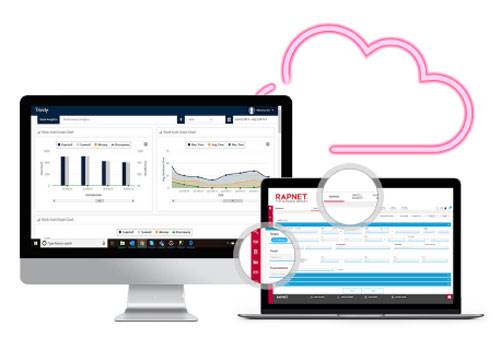 |
| L to R: Rareworks; Rapnet |
The risk posed was that you might fall behind in the most up-to-date or advanced version of the software.
That was the old days, then along came SaaS, perhaps unbeknown sneaking up on you.
Today your accounting program - whether it be MYOB, Xero, or Reckon - are all sitting in the cloud as a part of what’s described as the ‘subscription economy’.
SaaS is the supply of software, usually on a subscription basis, over the internet where there is no need to install and/or update software – it’s all done for you by the supplier.
The supplier maintains the servers, databases, and other hardware - and stores your data - to ensure a seamless delivery of your needs, be they accounting or otherwise.
Understanding SaaS
Broadly speaking a SaaS-based application is any software that is not hosted or run on your premises. It is served directly to you, hosted, pre-configured and ready to use for its specific purpose. The user requires no hardware to be purchased for the software, has nothing to install and does not need to create data back-ups.
Typically the user accesses the software via a web browser on any device, by simply paying a monthly or annual subscription fee to get access to the ready-made SaaS solution.
SaaS is not a plugin and does not sit on your computers or other devices. One of the key tenets is that there is no need to invest in or establish your own infrastructure for maintaining software products or servers.
The software is hosted externally in the cloud where the data – your emails, pictures and video – is stored on a network of Google servers and licensed and delivered via your internet browser.
If you require an internet connection to properly run a service your business uses, there’s a good chance it’s probably cloud-based.
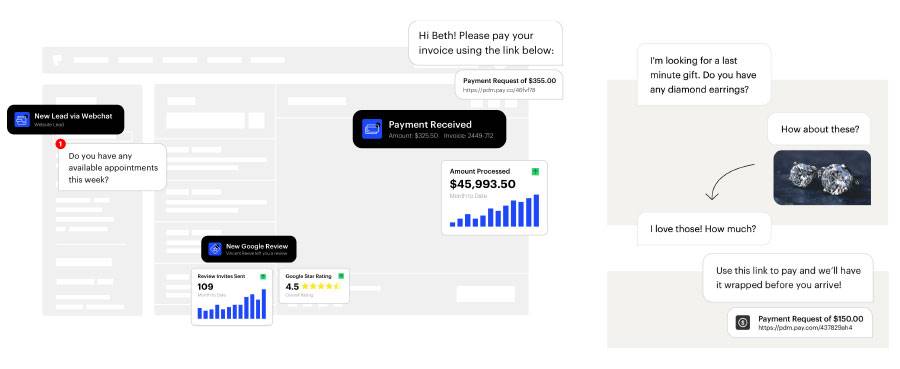
Subscription economy
The subscription economy refers to a shift away from the traditional pay-per-product model, such as the example provided earlier concerning buying the MYOB program and installing it on your computer.
This new system involves selling recurring subscriptions to consumers in exchange for access to a product or service
over time.
Often, but not always, these subscriptions can be paused or cancelled. Think Netflix, Amazon Prime, Spotify and so on.
It’s important to know that not all SaaS is subscription based. Gmail falls into this category, as it is free. Having signed-up for Gmail, the user then has an email account to be used anytime, anywhere in the world free of charge.
Therefore not all SaaS requires a subscription payment - there are many free SaaS services - but they all use cloud technologies.
That said, many people confuse SaaS and cloud based products believing them to be the same. Cloud-based products and services may sound like they’re referring to the same thing, however they are different.
While a service such as MYOB exists ‘in the cloud’ it will most likely be a SaaS-based application, however; your cloud-based services may not always be SaaS-based.
In a nutshell, the cloud was developed as a way to share data faster and more effectively. A cloud-based product or service is anything running in the cloud which will cover many other areas of IT including platforms and applications, hosted in the cloud.
In other words, the largest difference – or explanation - is that SaaS is only one part of the larger cloud.
Why this matters to you
By now you’re probably left with one question – why should I care?
The answer is that a well considered strategy of SaaS tools can completely transform the business of a jewellery retailer. SaaS tools present the opportunity to better manage your store and increase sales and profits.
How?
Think of it as a method of outsourcing of the important parts of your business that don’t relate to retailing to customers directly. Those time-consuming areas such as administration, stock control, buying, marketing and so on.
SaaS tools allow you to effectively hand over the creation, implementation, maintenance and updating of business software to the experts, so that you can get on with doing what you do best - selling to consumers.
Over the past decade there has been an enormous shift in growth strategies for businesses, brought about by an increasing preference by consumers and businesses to subscribe to services, rather than outright purchase products.
This trend gathered speed during the global pandemic, when everyone re-evaluated their lives. Consumers carefully considered what was important to them, and businesses evaluated why they operated in certain ways, and assessed the value of different procedures under new, often harsher circumstances.
The astute asked one question more-often-than not – why? Why stick to the traditional methods? Why can’t this business operate with fewer expenses, more efficiently?
This self analysis paired well with the newfound formula for increasing sales focused on monetising long-term customer relationships rather than selling products. These market shifts are driven by new models of consumption.
In short, consumer preferences have changed and businesses are beginning to understand that if they don’t meet their customers where they want to be, one of their competitors will.
It’s all about managing your business better and in different ways - using new technology - in order to compete in the digital economy.
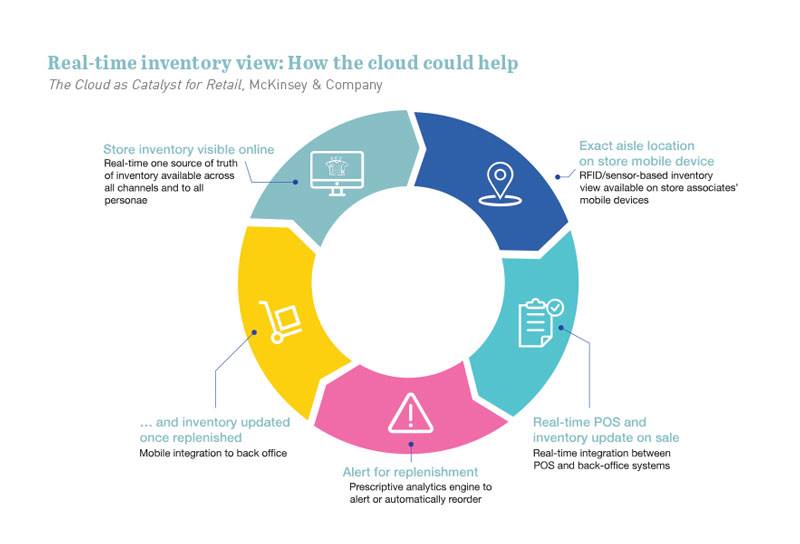
Consider the following
There is almost nothing that is not covered by a SaaS retail solution, some of which you may not have previously considered. They are all designed to reduce your workload and improve efficiency and productivity.
Website management is one major area of advancement in recent years, lining up well with increased consumer expectations. Business websites offer more today than at any point in the history of the internet.
Presenting potential customers with a high-quality website affords your business a range of benefits – credibility, lead generation, organic traffic, the opportunity to showcase your unique brand, and the chance to provide updates and announcements. Managing all of these utilities is made simpler using SaaS, rather than a dedicated in-house IT staff.
Furthermore, customer service capabilities are expanding, and perhaps most importantly, time is saved – whether it be because simple questions are easily answered online, avoiding lengthy phone calls with confused customers, or because inventory management can become somewhat automatic.
Another important component of this increasingly complex digital landscape for retailers is reputation management – something many SaaS programs attempts to manage.
Through a business such as Podium, a retailer can respond to a customer’s enquiries and schedule a consultation, send automated reminders ahead of their appointment, issue a one-touch payment link after they make a purchase and collect a Google review after their interaction is over.
With Podium, it’s all done via SMS, so even for new customers it’s a familiar and easy to navigate system.
According to Dave Scheine, country manager at Podium, businesses wildly misunderstand Australian consumers relationships with email as a platform.
“According to our recent research, almost half of Aussies have deleted an email from a business without opening it in the past 24 hours, while almost two-thirds have ignored an unsolicited call from a business in the past week.”
He continues: “Meanwhile 49 per cent say that businesses that use SMS to communicate appear more professional than those that don’t. Three-quarters of Australians say they’re reliant on SMS reminders to manage their day-to-day life tasks, while 69 per cent say an SMS reminder has saved them from missing an upcoming appointment.”
So what’s the key takeaway from this research? Consumer expectations are changing and businesses must keep up or risk falling behind.
Scheine says that if your business isn’t communicating with customers using methods that suit their tastes, it won’t take long before a competitor captures their attention.
“Take York Jewellers, for example,” he says. “They wanted to generate more reviews and provide more streamlined customer communications, so they engaged Podium. They use Webchat to engage with their customers at every stage of their journey, and eviews to collect more Google reviews after the completion of a sale or customer interaction.”
“The results speak for themselves. They’ve received over 400 total inbound leads in the past year, including 321 from Webchat, and facilitated 650 customer conversations. What’s more, prior to Podium, they had 32 Google reviews with an average rating of 4.6. Through Podium, they now have over 360 reviews with an average rating of 4.9. They’re just one of thousands of businesses, many of them jewellery retailers, seeing similar results.”
Further options
All of the SaaS programs which address customer service management aim for one thing – more time available for you with customers, face-to-face.
Inventory management was once one of the most time-consuming and frustrating tasks for many businesses. It can be painstakingly repetitive and diverts your time and attention from other facets of
the business.
It’s difficult to focus on improving the efficiency of your business, adding new products or promotions, or generally improving your brand when you’re trapped in the store room with a clipboard!
SaaS programs are able to accurately inform you how much stock you have on hand and using forecasting, can also advise on when you need to restock in order to avoid shortages. There are fewer things more grating to a customer than hearing that a coveted piece of jewellery is out of stock.
Error reduction is perhaps the most obvious benefit when it comes to managing inventory in the cloud. The automated nature of the software means that inevitable human errors are eliminated. Cutting down on missed orders or incorrect information saves your business time and money.
Meeting, and in some cases exceeding, the personalised security requirements of a store or business has never been easier with the decreasing cost of security equipment and the rise of accessibility as a result of cloud technology.
For jewellers, connecting security cameras with a cloud service is a recipe for a safe and secure business – even in the event that thieves interfere with the cameras themselves. When the footage from security cameras is backed up on the cloud, access is easy and simple around the clock.
Recorded CCTV footage is available and accessed anywhere at any time via a computer, mobile or tablet. Using the cloud can simplify the process of retrieving video information – even in the event that thieves damage the camera itself.
Marketing is made easier with services designed handle outbound emails and newsletters as well as handling loyalty programs.
Deloitte Australia partner Melissa Dean advises any retailer looking to maximise sales this holiday period must consider a well-oiled loyalty program.
“Loyalty programs that seamlessly bridge channels strengthen brand to consumer connection through well-known reward schemes encourage repeat purchase behaviour,” she explains.
“Loyalty programs also create additional, high impact touchpoints for greater customer understanding and value delivery improvement. Having a single customer view allows you to know your customer, and is your greatest strength in delivering excellence through personalisation, driving higher value business outcomes.”
Dean suggests that cloud-based software is an excellent method for managing such programs.
“Cloud-based systems can effectively underpin multi-channel selling. They allow for a seamless shopping experience by efficiently supporting retailers with real-time visibility of stock quantities and locations, inventory syncing and integration, tracking, reporting, forecasting, customer, vendor management and more.”

Buying and selling
The logistics associated with acquiring diamonds and gemstones has been revolutionised by online trading platforms, such as RapNet, Get-Diamonds and IDEX.
One relatively new face to the scene is Diamonds On Call – based in Hong Kong, the trading network recently celebrated five years of operation.
Diamonds On Call founder Harshil Shah says he expects the increase in retailer interest in the cloud and SaaS to continue long into the future.
“If you remember, post-recession diamond prices dropped rapidly and then picked up again from 2010 to 2013. From 2013 to 2020 the market kept dropping from 5-10 per cent every quarter and hit a sharp low of almost 40 per cent during the pandemic,” she explains.
“This was also during the times when cloud-based systems were introduced to almost all spheres and industries anew. And the retailers who initially were hesitant saw the opportunity to save time, effort and money and came on board to survive.”
She added: “With time, efficiency became obvious, and they adapted to the new way of working. We feel the number of retailers switching to this modern way of business will increase manifolds in the coming years.”
With an ever-growing number of programs and tools being made available to businesses to handle inventory management, customer data, and store security, Retail Edge Consultants Brown says that unsurprisingly, privacy remains a pivotal point of interest for retailers.
“I wouldn’t say that I’m seeing a big ‘movement’ when it comes to retailers endorsing a wide range of cloud technologies, however, we have cloud options available to all of our clients because many do want the option,” he says.
“I think from an industry point of view there’s still a lot of conservatism when it comes to this kind of thing, and the core reason of course is privacy. Jewellery retailers and business owners don’t want people to see their margins and they don’t want people to be able to identify what you might call their operational ‘point of difference.’
“Some feel that because it’s all going ‘online’ and is being stored in some data centre they may never visit, that they are exposed to security flaws. But still, I would describe the interest as growing.”
Rareworks is another recent addition to the industry, beginning in 2021 as RFID specialists. The business has since expanded to include an e-commerce platform, augmented reality, POS, business analytics and finance options – all created with the jewellers needs in mind.
Rareworks’ chief operating officer Susan Davidson agreed with Brown and said that soon, it may be impossible for tech-hesitant retailers to compete with those that embrace emerging opportunities.
“Retailers are increasingly looking for cloud-based software solutions. Customer expectations have changed from 9-5 access to 24/7 availability. To compete in this climate, businesses need more flexibility and accessibility outside of their brick-and-mortar stores,” Davidson explains.
“Whether it’s remote access to a POS to maintain an up-to-the-minute integrated website or the ability to log in to a cloud based book-keeping system, the need to work from any location is driving companies to transition to cloud-based systems. Cloud-based POS, accounting and human resource systems are vital for success today. Having a global cloud-based fleet of systems that work is what makes a modern-day business stand out from the rest.”
Don’t fall behind
It’s one thing to merely say – don’t fall behind. It’s another thing entirely for owners and managers to stay competitive via the mastery of emerging software technologies, especially when juggling the already time consuming responsibilities of running a business.
As part of a report for McKinsey Digital, associate partner Munmun Baishya explains the evolving landscape for retailers:
“Retail today is in the midst of an exciting revolution in which power has shifted from the retailer to the consumer.”
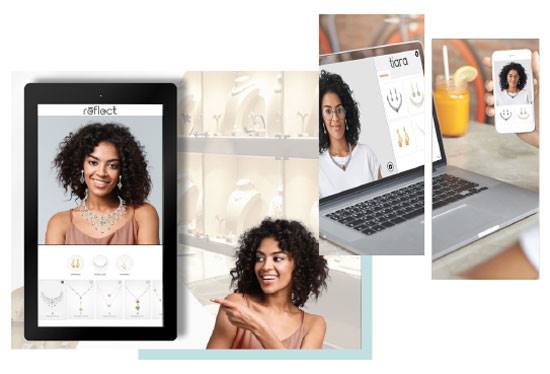 |
| Above: Rareworks |
“Consumers are influencing product trends through reviews and social media, doing extensive product research online, and expecting a seamless omnichannel experience across all touchpoints,” Baishya adds.
“Businesses’ demands for tech-enabled capabilities are compelling technology executives to advance and accelerate their technology-adoption schedules. An increasing number of leaders have come to recognise the critical role of the public cloud in facilitating their technological reinvention.”
Retailers face pressure to deliver new business capabilities faster. This, in turn, shrinks retailers’ margins and impacts all aspects of the retail value chain in some way, shape, or form.
For those hesitant to explore SaaS options, it’s important to remember that while learning and implementing new programs and services can be daunting the aim in the long run is to create a more efficient business, saving time and energy.
Learning to use a program like MYOB was once a daunting prospect too – today, it’s second nature for most. The number of SaaS services being developed specifically for jewellery retailers and store managers increases every year (see panel opposite).
Perhaps some day soon, many of the SaaS programs discussed above will feel so interwoven into your business that they’re an all-but invisible aspect of your efficient, time-rich business.
'Retail in the Cloud' Contents
View other profiles (Alpha order) »
read emag